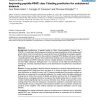Free Online Productivity Tools
i2Speak
i2Symbol
i2OCR
iTex2Img
iWeb2Print
iWeb2Shot
i2Type
iPdf2Split
iPdf2Merge
i2Bopomofo
i2Arabic
i2Style
i2Image
i2PDF
iLatex2Rtf
Sci2ools
BMCBI
2008
2008
Improving peptide-MHC class I binding prediction for unbalanced datasets
Background: Establishment of peptide binding to Major Histocompatibility Complex class I (MHCI) is a crucial step in the development of subunit vaccines and prediction of such binding could greatly reduce costs and accelerate the experimental process of identifying immunogenic peptides. Many methods have been applied to the prediction of peptide-MHCI binding, with some achieving outstanding performance. Because of the experimental methods used to measure binding or affinity between peptides and MHCI molecules, however, available datasets are enriched for nonbinders, and thus highly unbalanced. Although there is no consensus on the ideal class distribution for training sets, extremely unbalanced datasets can be detrimental to the performance of prediction algorithms. Results: We have developed a decision-theoretic framework to construct cost-sensitive trees to predict peptide-MHCI binding and have used them to 1) Assess the impact of the training data's class distribution on class...
BMCBI 2008 | Peptides | Predictions | Training |
| Added | 09 Dec 2010 |
| Updated | 09 Dec 2010 |
| Type | Journal |
| Year | 2008 |
| Where | BMCBI |
| Authors | Ana Paula Sales, Georgia D. Tomaras, Thomas B. Kepler |
Comments (0)

